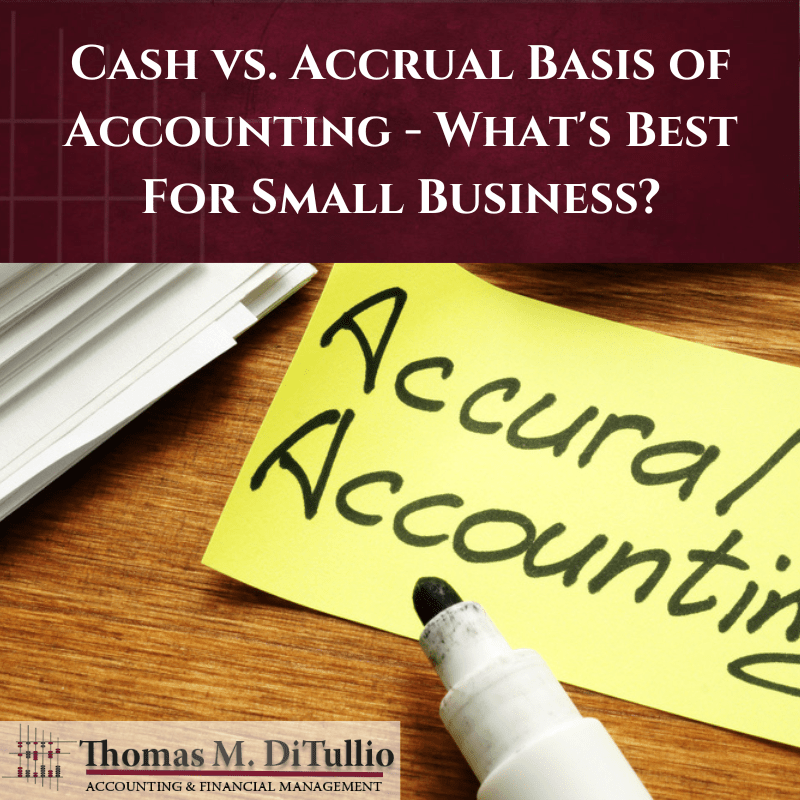Cash vs. Accrual Basis of Accounting – What’s Best For Small Business?
Choosing the right accounting type for your small business can be a challenge. Cash and accrual accounting might seem similar, but choosing the wrong one can hurt your financial reports. When you know which one works for your purposes, you can keep all your books in order. Here are the differences between cash and accrual accounting.
What Is Cash Basis Accounting?
Before choosing the right accounting method, you need to know the basics. Let’s start with cash basis accounting. When you use these methods, you will record the income as it is received. All expenses are recorded when paid as well. With cash basis accounting, you only record the money when it enters or leaves the account. For example, if you have a restaurant that purchased supplies on credit for June but will not pay the bill until July, it is recorded as a July expense. With these accounting methods, you will not have any accounts payable or accounts receivable.
Since cash basis accounting is a simple way to track your financial records, many small businesses and sole proprietors use this method. If you make less than $25 million in annual sales with no direct-to-consumer merchandise, then cash basis accounting could be a good option. Cash basis accounting has a shorter learning curve than accrual accounting. There are a few items to record, making tracking your revenue and expenses more manageable.
Unfortunately, cash basis accounting does not provide you with the most accurate financial picture. You might think you have a high cash flow when it is just the result of your previous month’s work. Cash basis accounting does not conform to the GAAP standards. If you think your business will grow in the future, you might not want to choose this method.
What Is the Accrual Method?
With the accrual accounting methods, all expenses and incomes are recorded when earned and billed. This method abides by the generally accepted accounting principles (GAAP). With these methods, you will have a clearer picture of your finances. For example, if your business bills a client for $1,000 in March, you record that income for the month, even if the funds don’t reach your account until April. The same is done for expenses.
Some small businesses use accrual accounting as their primary method. However, if your company produces over $25 million in sales revenue during a three-year period, you must use the accrual method.
Many small business owners avoid accrual basis accounting because it is resource-intensive. There will be plenty of extra steps and paperwork associated with this method. You will need to have an adequate cash flow to ensure all bills are covered from month to month. Unfortunately, this method does not provide an accurate short-term view of your financial health.
Accrual Vs. Cash Basis: Which Is Better for Small Business?
Now that you know the basics of these accounting methods, it is time to choose the right one for your small business. If you have a small business that primarily takes cash transactions and does not have a large inventory of products, then the cash basis method might be the right choice for you. This method is a reliable, convenient, and easy way to track your expenses and revenue without knowing much about bookkeeping.
Accrual accounting is definitely the better option if you want an updated and accurate accounting of your company’s financial health. For the most part, accrual accounting can be a little intimidating. You can always hire small business accounting services to help with your finances. Here are some other factors to consider when choosing your accounting method.
Sales Revenue
You should take a look at your sales revenue. If you have more than $25 million in annual revenue, you must use the accrual methods according to GAAP. Many small businesses might not have hit that amount, but it could be a possibility in the future. Keep that in mind for your business.
Complexity of Your Business
Depending on the complexity of your books and industry, one accounting method might be the better choice. For example, you should avoid the cash-based accounting method if your business has multiple accounts, various LLCs, and hundreds of employees. With those methods, you will not be able to gather information about your financial picture from the balance sheets, cash flow statements, or income statements.
Public Company
According to the GAAP guidelines, if you have a public company or one that will go public in the future, you need to use the accrual basis. These types of businesses have to report an accurate view of their financial health to shareholders.
Final Word
Before choosing the right small business accounting method, you must thoroughly examine your company. While you can always switch the methods later, it can be a hassle and disrupt business. Many accounting tools and professional services help you accurately account for your financials. Whether you choose accrual or cash basis accounting, you always want to select the right option that will work for your business. Plus, you must make sure to stay compliant with those GAAP standards.
Do you need an accountant for my small business? Reach out to TMD Accounting. Whether you choose the cash basis or accrual accounting method, we will make sure you have an accurate record of your financial health. We have helped small businesses throughout Gloucester County for over 40 years. Schedule your consultation by calling 1-856-228-2205.

